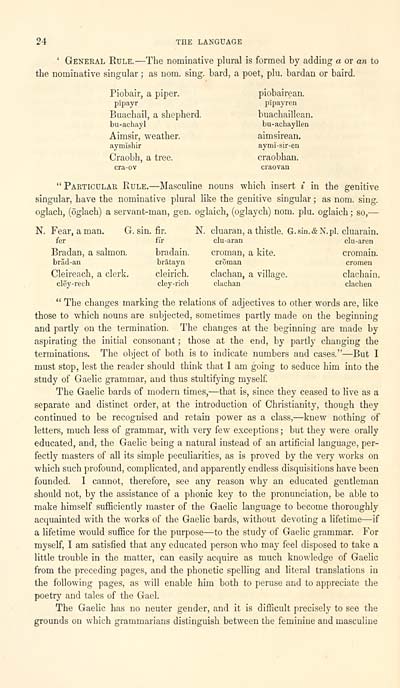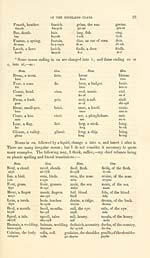Download files
Complete book:
Individual page:
Thumbnail gallery: Grid view | List view

24 THE LANGUAGE
' General Rule. — The nominative plural is formed by adding a or an to
the nominative singular ; as nora. sing, bard, a poet, plu. bardan or baird.
Piobair, a piper. piobaireau.
plpayr plpayren
Buachail, a shepherd. buachaillean.
bu-achayl bu-achayllen
Aimsir, weather. aimsirean.
ayiiiislur ayml-sir-en
Craobh, a tree. craobhan.
cra-ov craovan
" Particular Rule. — Masculine nouns which insert i in the genitive
singular, have the nominative plural like the genitive singular ; as nom. sing,
oglach, (òglach) a servant-man, gen. oglaich, (oglaych) nom. plu. oglaich ; so, —
N. Fear, aman. G.sin. fir. N. cluaran, a thistle. G. sin. &N. pi. cluaraiu.
fer I'ir clu-aran clu-aren
Bradan, a salmon. bradain. croman, a kite. cromain.
brad-an br.ltayn croman cromen
Cleireach, a clerk. cleirich. clachan, a village. clachain.
cley-rech cley-rich clachan clachen
" The changes marking the relations of adjectives to other words are, like
those to which nouns are subjected, sometimes partly made on the beginning
and partly on the termination. The changes at the beginning are made by
aspirating the initial consonant ; those at the end, by partly changing the
terminations. The object of both is to indicate numbers and cases." — But I
must stop, lest the reader should think that I am going to seduce him into the
study of Gaelic grammar, and thus stultifying myself
The Gaelic bards of modern times, — that is, since they ceased to live as a
separate and distinct order, at the introduction of Christianity, though they
continued to be recognised and retain power as a class, — knew nothing of
letters, much less of grammar, with very few exceptions ; but they were orally
educated, and, the Gaelic being a natural instead of an artificial language, per-
fectly masters of all its simple peculiarities, as is proved by the very works on
which such profound, complicated, and apparently endless disquisitions have been
founded. I cannot, therefore, see any reason why an educated gentleman
should not, by the assistance of a phonic key to the pronunciation, be able to
make himself sufSciently master of the Gaelic language to become thoroughly
acquainted with the works of the Gaelic bards, without devoting a lifetime — if
a lifetime would suffice for the purpose — to the study of Gaelic grammar. For
myself, I am satisfied that any educated person who may feel disposed to take a
little trouble in the matter, can easily acquire as much knowledge of Gaelic
from the preceding pages, and the phonetic spelling and literal translations in
the following pages, as will enable him both to peruse and to appreciate the
poetry and tales of the Gael.
The Gaelic has no neuter gender, and it is difiBcult precisely to see the
grounds on which grammarians distinguish between the feminine and masculine
' General Rule. — The nominative plural is formed by adding a or an to
the nominative singular ; as nora. sing, bard, a poet, plu. bardan or baird.
Piobair, a piper. piobaireau.
plpayr plpayren
Buachail, a shepherd. buachaillean.
bu-achayl bu-achayllen
Aimsir, weather. aimsirean.
ayiiiislur ayml-sir-en
Craobh, a tree. craobhan.
cra-ov craovan
" Particular Rule. — Masculine nouns which insert i in the genitive
singular, have the nominative plural like the genitive singular ; as nom. sing,
oglach, (òglach) a servant-man, gen. oglaich, (oglaych) nom. plu. oglaich ; so, —
N. Fear, aman. G.sin. fir. N. cluaran, a thistle. G. sin. &N. pi. cluaraiu.
fer I'ir clu-aran clu-aren
Bradan, a salmon. bradain. croman, a kite. cromain.
brad-an br.ltayn croman cromen
Cleireach, a clerk. cleirich. clachan, a village. clachain.
cley-rech cley-rich clachan clachen
" The changes marking the relations of adjectives to other words are, like
those to which nouns are subjected, sometimes partly made on the beginning
and partly on the termination. The changes at the beginning are made by
aspirating the initial consonant ; those at the end, by partly changing the
terminations. The object of both is to indicate numbers and cases." — But I
must stop, lest the reader should think that I am going to seduce him into the
study of Gaelic grammar, and thus stultifying myself
The Gaelic bards of modern times, — that is, since they ceased to live as a
separate and distinct order, at the introduction of Christianity, though they
continued to be recognised and retain power as a class, — knew nothing of
letters, much less of grammar, with very few exceptions ; but they were orally
educated, and, the Gaelic being a natural instead of an artificial language, per-
fectly masters of all its simple peculiarities, as is proved by the very works on
which such profound, complicated, and apparently endless disquisitions have been
founded. I cannot, therefore, see any reason why an educated gentleman
should not, by the assistance of a phonic key to the pronunciation, be able to
make himself sufSciently master of the Gaelic language to become thoroughly
acquainted with the works of the Gaelic bards, without devoting a lifetime — if
a lifetime would suffice for the purpose — to the study of Gaelic grammar. For
myself, I am satisfied that any educated person who may feel disposed to take a
little trouble in the matter, can easily acquire as much knowledge of Gaelic
from the preceding pages, and the phonetic spelling and literal translations in
the following pages, as will enable him both to peruse and to appreciate the
poetry and tales of the Gael.
The Gaelic has no neuter gender, and it is difiBcult precisely to see the
grounds on which grammarians distinguish between the feminine and masculine
Set display mode to: Large image | Transcription
Images and transcriptions on this page, including medium image downloads, may be used under the Creative Commons Attribution 4.0 International Licence unless otherwise stated. ![]()
| Early Gaelic Book Collections > Blair Collection > Treatise on the language, poetry, and music of the Highland clans > (36) |
|---|
| Permanent URL | https://digital.nls.uk/76236799 |
|---|
| Description | A selection of books from a collection of more than 500 titles, mostly on religious and literary topics. Also includes some material dealing with other Celtic languages and societies. Collection created towards the end of the 19th century by Lady Evelyn Stewart Murray. |
|---|
| Description | Selected items from five 'Special and Named Printed Collections'. Includes books in Gaelic and other Celtic languages, works about the Gaels, their languages, literature, culture and history. |
|---|

